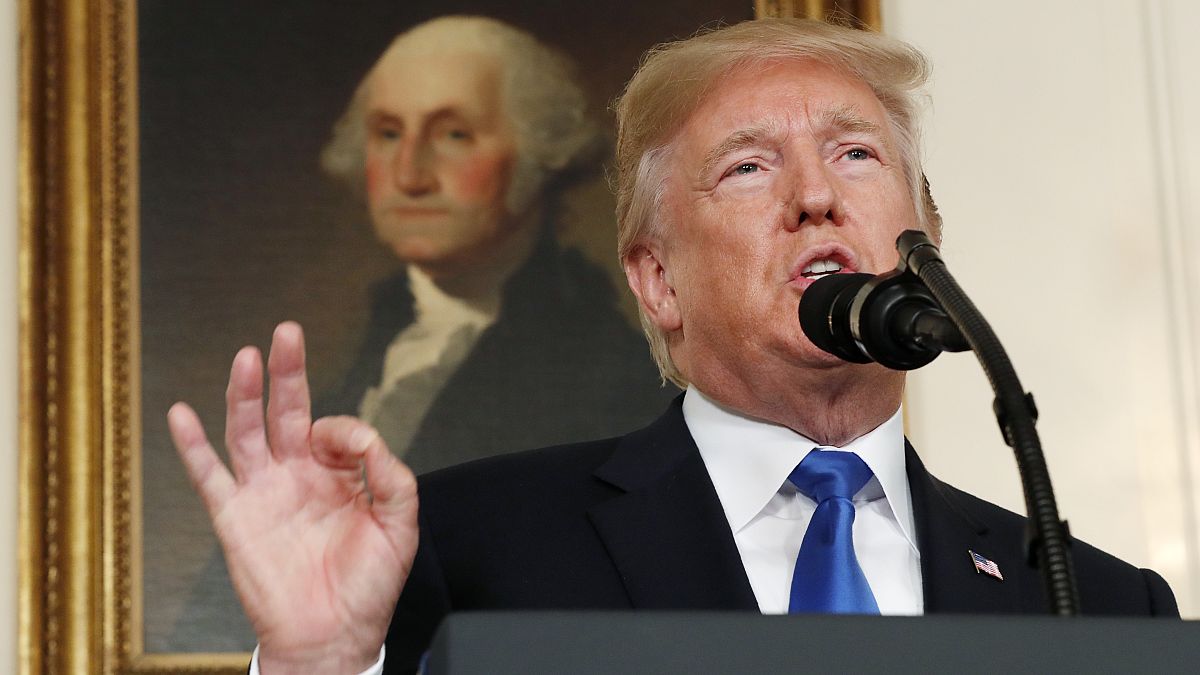Can Macron and Merkel convince US President Donald Trump from leaving the Iran Nuclear Deal? Euronews asks an expert.
Donald Trump has until 12 May to decide whether to restore US sanctions against Iran. This week, two important EU leaders, Macron and Merkel will meet US President to address the issue. Before May 12, the Europeans will try to convince Trump not to "tear up" the Iran nuclear deal. But despite well-advanced negotiations, nobody really knows if that will be enough to satisfy the American president.
Euronews interviewed Steven Blockmans, Senior Research Fellow & Head of EU Foreign Policy, CEPS and Professor of EU External Relations Law, University of Amsterdam.
Euronews: Can Macron and Merkel keep Trump From Shredding the Iran Deal? Do They really want to convince Trump?
Steven BLockmans (SB): Macron wants to convince Trump that France, Germany and the UK (the E3) share his legitimate concerns about Iran’s ballistic missile programme, its backing of the murderous regime of President Assad and its negative influence on regional security. At the same time, Macron wants to insist that there are good reasons that the nuclear deal be kept intact, that EU member states governments and parliaments across the board want the US to remain committed to the accord and that, therefore, the US President should recertify the nuclear accord when the statutory deadline expires on May 12.
That is a tall order, given Trump’s long and consistent line that the Joint Comprehensive Plan of Action (JCPOA) - which was negotiated during Barack Obama's presidency - an "embarrassment" that needs to be "corrected" and is not in the US’ interest.
What he is talking about here is the deal's "sunset" clauses -- expiration dates after which Iran could resume uranium enrichment. The US is looking for an extension of those dates beyond 2025. Trump also sees weakness in the inspection regime under which the International Atomic Energy Agency (IAEA) verifies Iran's compliance with its commitments because it does not provide full access to military sites.
Hardliners like Mike Pompeo and John Bolton, who have now joined Team Trump in leading roles, have also said that this leaves Iran with too much leeway to cheat IAEA inspectors and the international community.
The Trump administration has in its first year made sudden U-turns on other international files, so it is not impossible that the President will recertify the JCPOA on May 12. But he will want to see something substantial in return.
In order to placate Trump, the E3 have been lobbying their fellow member states to impose additional sanctions on Iran, but so far they have been unsuccessful.
Euronews: Britain, France, and Germany have proposed fresh EU sanctions on Iran over its ballistic missiles and its role in Syria’s war to persuade Washington to preserve the 2015 nuclear deal with Tehran. Could this strategy work? Why did sanctions proposal fail in FAC of April 16?
SB: The travel bans and asset freezes proposed by France, Germany and the UK were intended to show that the EU shares US concerns. Italy led a small group of member states in voicing concerns that the proposed sanctions — which require unanimity — could jeopardise the nuclear deal because they would undermine Iranian reformers without satisfying President Trump.
But those countries may still fall into line before May 12 for the sake of allowing the EU to take firm action in response to Trump’s attacks on what they believe is the best deal that could have been achieved after more than 12 years of delicate diplomatic negotiations.
To be sure, the sanctions would not directly address Trump’s complaints about the nuclear deal, i.e. his demand that there needs to be tighter monitoring of Iran’s compliance with the accord and that “sunset clauses” under which curbs on various Iranian nuclear activities fall away from 2025 should be extended. But the UK, Germany, and France want to show the US president that they are serious in addressing his concerns about Iran. The sanctions would, in any case, need to be part of a wider package of measures that goes as far as possible in responding to US criticisms of the accord.
Euronews: So do you think the EU is the only player who can save the deal? What is the role of Russia over Iran nuclear deal?
SB: Russia and China, the other signatories of the JCPOA prize the nuclear deal. Europe should make common cause with them. If together, they manage to keep Iran wedded to the agreement, then the deal stands a chance of surviving. They will have to persuade Tehran that, as long as it continues to honour its side of the bargain, Iran can continue receiving most of the benefits promised by the JCPOA, even if the US ceases to be a party.
